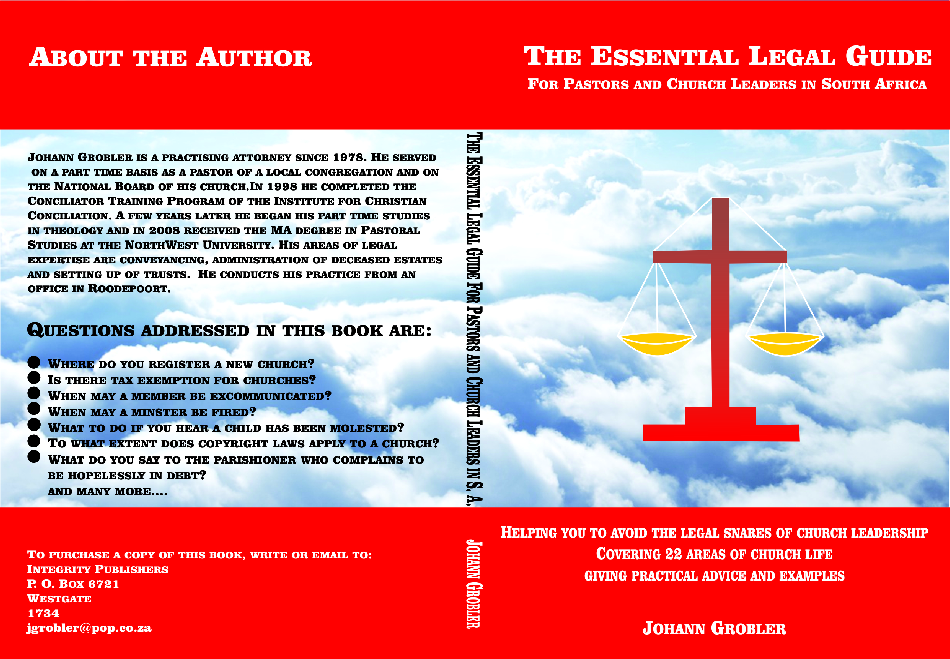WHEN YOU SELL YOUR PROPERTY
Do you know what your rights are when you sell your house/residence- probably your most valuable asset?
Here are some questions often asked and the answers:
Why are attorney’s charges so high?
Most attorneys charge their fees according to the tariff recommended by the Law Society. These fees are not unreasonably high. One must remember that where transfer duty is payable, that is usually the largest component of the total charges. The transfer duty is payable to the Receiver of Revenue.
Who should pay the attorney’s charges?
Usually it’s the Purchaser that pays the costs. The parties are however free to agree that the costs (often limited to a certain maximum) be included in the purchase price.
Do you know what your rights are when you sell your house/residence- probably your most valuable asset?
Here are some questions often asked and the answers:
Why are attorney’s charges so high?
Most attorneys charge their fees according to the tariff recommended by the Law Society. These fees are not unreasonably high. One must remember that where transfer duty is payable, that is usually the largest component of the total charges. The transfer duty is payable to the Receiver of Revenue.
Who should pay the attorney’s charges?
Usually it’s the Purchaser that pays the costs. The parties are however free to agree that the costs (often limited to a certain maximum) be included in the purchase price.
What amounts are usually payable by the Seller?
1.If there is a bond over the property, the bond needs to be cancelled and fee for the cancellation of one bond (approximately R4000 per bond) is for the Seller’s account.
2.Rates and taxes levied on the property until date of registration of transfer, is for the Seller’s account.
3.The agent’s commission is payable by the Seller.
1.If there is a bond over the property, the bond needs to be cancelled and fee for the cancellation of one bond (approximately R4000 per bond) is for the Seller’s account.
2.Rates and taxes levied on the property until date of registration of transfer, is for the Seller’s account.
3.The agent’s commission is payable by the Seller.
Tell me about the “cooling off period”
Where the selling price is not more than R250 000 and the purchaser is a natural person (not a CC or Company), the purchaser has 5 days from making his offer to get out of the deal.
Who chooses the attorney?It is the Seller’s right to choose the attorney. The parties may agree to use another attorney. The estate agent may recommend an attorney, but he may not encourage or influence any party to the transaction to utilize or refrain from using the services of a particular conveyancer or firm of attorneys. Such conduct would be in breach of the Code of Conduct for Estate Agents.
What are the implications of a sole mandate?
A sole mandate gives one estate agent’s firm the exclusive authority to sell your property. It also has to be in writing. It must reflect an expiry date and the implications if the property is sold without the assistance of the sole agent, prior to the expiry dare. (Usually the implications are that the Seller must pay the agent’s commission in full.)
What is the standard agent’s commission?
There is no fixed standard. You or your property consultant can negotiate any commission percentage. An agent who informs a Seller that he may not by law charge less than a certain percentage, is acting contrary to the Code of Conduct. Most agents charge 7% plus VAT.
Must I use an estate agent?
No. There is no law that forces you to use an agent. Most people would however find it difficult to market and sell their property without the assistance of an agent.
The advantages of using an agent:
1.The agent’s technical expertise or negotiating skills;
2.The principal’s emotional involvement in a high-stakes deal, which hampers his ability to negotiate effectively;
3.The principal’s desire to avoid having to answer certain questions or react to a new proposal on the spot;
4.The agent’s ability to float a trial balloon without implicating his principal;
The potential risks in using an agent:
5.Faulty communication between principal and agent that harms the principal’s cause;
6.An agent with his own agenda or bias who doesn’t faithfully represent his principal;
7.A principal who won’t level with his agent and thus impairs their dealings with the other side;
What pitfalls should I watch for before accepting an Offer to Purchase?
It is impossible to cover all the situations briefly in writing. Since it is such an important transaction, we recommend that you have it checked by your conveyancing attorney, before you sign.
********
Where the selling price is not more than R250 000 and the purchaser is a natural person (not a CC or Company), the purchaser has 5 days from making his offer to get out of the deal.
Who chooses the attorney?It is the Seller’s right to choose the attorney. The parties may agree to use another attorney. The estate agent may recommend an attorney, but he may not encourage or influence any party to the transaction to utilize or refrain from using the services of a particular conveyancer or firm of attorneys. Such conduct would be in breach of the Code of Conduct for Estate Agents.
What are the implications of a sole mandate?
A sole mandate gives one estate agent’s firm the exclusive authority to sell your property. It also has to be in writing. It must reflect an expiry date and the implications if the property is sold without the assistance of the sole agent, prior to the expiry dare. (Usually the implications are that the Seller must pay the agent’s commission in full.)
What is the standard agent’s commission?
There is no fixed standard. You or your property consultant can negotiate any commission percentage. An agent who informs a Seller that he may not by law charge less than a certain percentage, is acting contrary to the Code of Conduct. Most agents charge 7% plus VAT.
Must I use an estate agent?
No. There is no law that forces you to use an agent. Most people would however find it difficult to market and sell their property without the assistance of an agent.
The advantages of using an agent:
1.The agent’s technical expertise or negotiating skills;
2.The principal’s emotional involvement in a high-stakes deal, which hampers his ability to negotiate effectively;
3.The principal’s desire to avoid having to answer certain questions or react to a new proposal on the spot;
4.The agent’s ability to float a trial balloon without implicating his principal;
The potential risks in using an agent:
5.Faulty communication between principal and agent that harms the principal’s cause;
6.An agent with his own agenda or bias who doesn’t faithfully represent his principal;
7.A principal who won’t level with his agent and thus impairs their dealings with the other side;
What pitfalls should I watch for before accepting an Offer to Purchase?
It is impossible to cover all the situations briefly in writing. Since it is such an important transaction, we recommend that you have it checked by your conveyancing attorney, before you sign.
********

